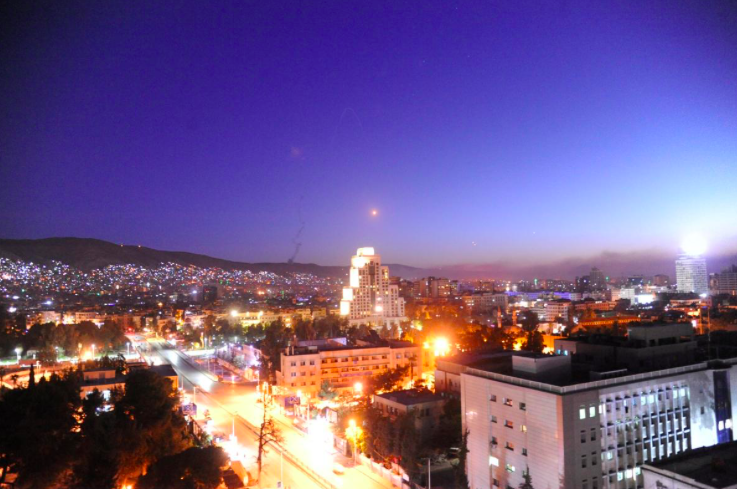British church leaders and peers meet with Syrian officials hours after bombing
British peers and church leaders met with Syrian government officials just hours after the UK struck the regime's chemical weapons stores on Saturday morning.
The group was led by Rev Andrew Ashdown, an Anglican priest and vocal supporter of President Bashar al-Assad's government, and also included the columnist and priest Giles Fraser, crossbench peers Baroness Cox and Lord Dykes, as well as Michael Langrish, the former bishop of Exeter, according to the Telegraph.

The delegation discussed the 'illegal' strikes carried out by British, American and French jets in a meeting with Hammouda Youssef Sabbagh, speaker of the People's Council of Syria, and 20 MPs on Sunday.
Fraser tweeted: 'With the Grand Mufti of Syria – the top Muslim cleric in Syria – in the astonishing Umayyad Mosque in central Damascus talking about how love is stronger than missiles. Very warm greeting despite the bombings.'
With the Grand Mufti of Syria - the top Muslim cleric in Syria - in the astonishing Umayyad Mosque in central Damascus talking about how love is stronger than missiles. Very warm greeting despite the bombings. pic.twitter.com/OxZpqcAulE
— Giles Fraser (@giles_fraser) 14 April 2018
The delegation's visit was designed to highlight the plight of Syria's minority Christian community, who tend to see Assad as their protector and a force for stability.
Official UK diplomatic relations with Syria were severed after Assad's forces massacred 108 civilians in the Houla area in May 2012 but a number of politicians and groups have continued to visit in support of Assad.
Fascinating meeting today discussing the long tradition of religious pluralism in Syria with the Minister for Religious Affairs. And the view from his office window. pic.twitter.com/O28lg0g8Ez
— Giles Fraser (@giles_fraser) 15 April 2018
Over the weekend the leaders of Syria's three major churches voiced their support of Assad, denying he held chemical weapons and condemning the airstrikes as 'unjustified aggression' and a 'clear violation of the international laws'.
Damascus such a beautiful place. Some people I have met talked about going onto their roofs to watch the US's "firework display". Most seem to have slept through it. pic.twitter.com/c8b15ESv9I
— Giles Fraser (@giles_fraser) 15 April 2018
They called on the United Nations' Security Council, where France, the US and the UK all hold permanent seats, to 'play its natural role in bringing peace rather than contribute to escalation of wars'.
They also urged churches in the UK, US and France to 'fulfill their Christian duties' and 'condemn this aggression and to call their governments to commit to the protection of international peace'.
The joint statement was signed by John X, the Greek Orthodox Patriach of Antioch and all the East, Ignatius Aphrem II, Syrian Orthodox Patriach of Antioch and all the East, and Jospeh Absi, Melike-Greek Catholic Patriach of Antioch, Alexandria and Jerusalem.











